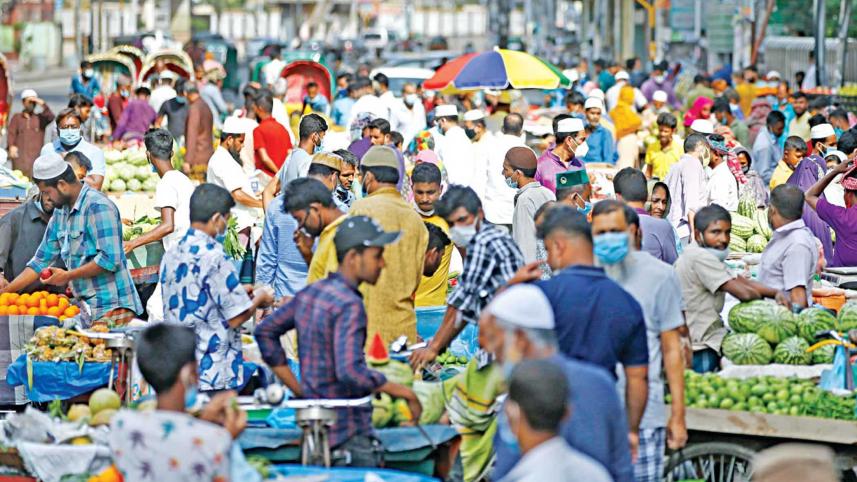Lax policing of mask use a cause for concern

Masks help save lives. There can't be a clearer or more powerful message than this to stem Covid-19 infections, especially at a time when the supply of vaccines has been consistently inconsistent, to say the least. Yet it continues to be ignored. Large numbers of people are still seen on the streets without their faces covered, with little or no initiative from the authorities to enforce the safety guidelines. This is especially disconcerting given recent warnings by experts that another wave of Covid-19 might be just around the corner, despite a steady dip in infection and death rates over the last three weeks. Against this backdrop, a new survey shows that there is no alternative to proper mask wearing as it can reduce the chances of contracting Covid-19 up to 34 percent.
The study—conducted by researchers from Stanford Medicine School and Yale University between November 2020 and April 2021 in rural Bangladesh, and involving nearly 350,000 individuals in 600 villages—is said to be the largest of its kind. Among its major findings are: a) Awareness campaigns can increase the use of masks up to three times; b) Surgical masks are more effective than fabric ones in preventing transmission; and c) Wearing masks properly reduces the symptomatic infection rate by 34 percent among the most vulnerable group aged 60 and above. These findings are more or less consistent with that of other studies on mask-wearing norms that invariably conclude that while getting people to wear masks consistently is no easy task, it is not very difficult either with proper interventions, including strict monitoring by law enforcement agencies, exemplary initiatives by local leaders, free mask distribution, and other promotional activities.
Such preventative strategies assume additional significance when you consider the poor state of mass inoculation in the country, with only 4 percent of the population fully vaccinated so far. This state is a far cry from the official target of vaccinating 80 percent (135.1 crore) of the population in the country. If the vaccination campaign continues at its current pace, it may take around 10 years to reach that target. This simply can't be the way forward. Although the prime minister is confident that the government can get more than one crore doses of vaccines every month—and the health minister has recently claimed that the government purchased vaccines worth about Tk 3,000 crore within a short time—our past experience with assurances vs reality regarding vaccine delivery makes for guarded optimism. In any case, with widespread vaccination still a work in progress, our best line of defence remains preventative strategies like masks.
We urge the government to provide a renewed focus on enforcing mask-wearing among other safety guidelines—by engaging local administrations, political parties and faith leaders to give the awareness campaign a boost—while urgently securing vaccines, both through purchases and local production. Law enforcement agencies also must step up their game to ensure that people wear masks.



 For all latest news, follow The Daily Star's Google News channel.
For all latest news, follow The Daily Star's Google News channel.
Comments